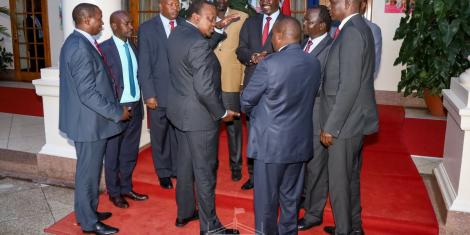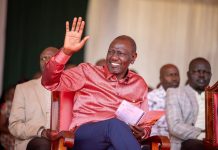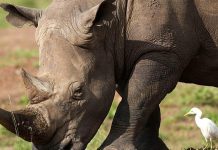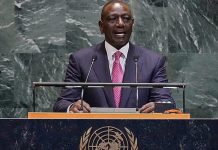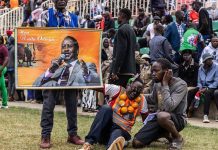AfricaPress-Kenya: President Uhuru Kenyatta’s days as a power-sharing Head of State are over.
In recent months, the president has been reconstructing political control and influence around himself. What remains are the finishing touches, through the Building Bridges Initiative (BBI).
Instead of being a lame duck president in the sunset of his second term, Uhuru is getting everyone in politics and public administration to be answerable to him. This is regardless of political party affiliation, or position in politics.
A successful BBI is expected to crown the remaking of political power since the nusu mkate government days of President Mwai Kibaki and Prime Minister Raila Odinga.
The BBI is expected to firm up the necessary elements of law, even as the president continues to manage the politics.
The first five years of his tenure created the impression that Uhuru was in a co-presidency with his deputy, William Ruto, in the Jubilee Alliance of TNA and URP.
The legal adversity facing them in the days of the International Criminal Court (ICC) tied them up in the Gordian Knot of self-preservation.
They carried this into an awkward first term. They appointed the Cabinet together, turned out in public in matching attire and addressed public functions like partners.
Enter the handshake
Then came the Handshake of March 2018, following the troubled presidential election the previous year. Ruto was traded in for Odinga.
In exchange, Uhuru got the recognition and legitimacy that Raila had denied him after the 2017 election. Raila has since comported himself in public like a co-star in the presidency.
Cabinet Secretaries have briefed him at his private offices on undisclosed matters. He behaves at functions as Uhuru’s alter ego, with the two bowing to each other as political brothers.
The notion of shared power is, however, slowly but surely perishing. Uhuru is breathing life into his words late last year that he is in charge and in control.
But, beyond consolidation of power, what could President Kenyatta be up to? What does he intend to do with consolidated political power?
At the burial of Hannah Atsianzale, the mother to ANC party leader, Musalia Mudavadi, late last year, a visibly irate Uhuru told the country that he was fully in the driver’s seat. He had sat patiently, the whole day, listening to a series of slapdash political lectures and sundry bosh, some directed at him.
COTU Secretary General, Francis Atwoli, melodramatically asked the president to crack the whip on politicians whom he accused of not toeing the line. He offered to help if the head of State was not equal to the task. Kakamega Senator, Cleophas Malala, raised the curtain to Atwoli’s counsel to the president.
An irate Uhuru singled the two out in his terse reply to critics. He cut to the chase. “When you see a lion that has been rained on, do not mistake it for a cat,” he said, “I am fully in control and in charge in this country.”
Recent happenings leave no doubt that the president is calling everyone’s bluff. He is seen less in public. But when he appears, it is with some memorable message, by word or in deed. Recent optics of him and coastal governors, Ali Hassan Joho of Mombasa, Kilifi’s Amason Kingi and – separately – Salim Mvurya of Kwale, sent tongues wagging.
Unverified reports suggested that he was disturbed that the coastal leaders were forming a regional political party. This would be contrary to the letter and spirit of the 2010 Constitution and the Political Parties Act (2011) and its amendments of 2017.
One Kenya Alliance
Yet, if anyone should attempt to form a party outside the legal framework, there would be no need for the president to intervene, as has been claimed.
That is the remit of the Registrar of Political Parties, who is on record for rejecting numerous non-compliant applications to register political parties. Hence, we must look elsewhere for answers to what is going on at State House.
The most obvious happening is the consolidation of political power. Apart from the meetings with the coastal leaders, there have been other telling happenings. The emergence of the One Kenya Alliance symbolises the return of Kanu, with President Kenyatta in the lead with Baringo Senator Gideon Moi of Kanu, as a close aide.
Put together with Wiper’s Kalonzo Musyoka, ANC’s Mudavadi and Senator Wetang’ula’s Ford Kenya, the alliance is a jaw dropper. It begins placing the centre of power where President Moi wanted it in 2002.
With the exception of Deputy President Ruto, who is ploughing his own furrow, does the new generation of would-have-been Kanu leaders in 2002 seem to have groped in the political dark and eventually found a common place to start from afresh?
Does the new formation seem to be blurring Raila, and elbowing him out from the centre? Did Uhuru place Raila on a slow puncture with the Handshake? Has Odinga lost his script or, his lines in the unfolding political drama?
And what does the president want to do with a renascent Kanu in the guise of One Kenya Alliance? Can Raila and Ruto survive the intrigues that seem to inform the alliance’s bag of tricks?
When the Handshake and the BBI came to occupy the centre stage of politics, it seemed rather obvious that the president and his perennial arch rival had closed ranks, at last.
It seemed that the former Prime Minister was the person President Kenyatta now had his sights on as his successor.
The challenge remained how to successfully market and sell him in the Mt Kenya region. For, with the exception of the short-lived goodwill from the “Kibaki Tosha” declaration of 2002, the region has been allergic to the Odinga name.
Jaundiced propaganda was initially aimed at his father, Jaramogi Oginga Odinga, in the 1960s. He was cast as a person “who wanted to take away power” from the elder Kenyatta and to emasculate the Kikuyu people.
The Odinga name remains the local political bugaboo. If you want anything done, you simply tell the people to be swift, lest Raila should ascend to power.
For a moment, therefore, it has seemed that undoing this historical jinx was Uhuru’s biggest challenge in the region, ahead of his retirement.
Besides, the challenge has seemed to snowball in the wake of what has looked like Ruto’s hold on the Mountain. These incursions have, moreover, been bed-rocked on Uhuru’s own declarative promise of support for Ruto in 2022, with the mantra of “Ten years for me, and ten for Ruto.”
The One Kenya Alliance is the new Pentagon in town. The only disguised part of the five-piece pie chart is Uhuru himself. Played around the proposed BBI Executive of five, however, you do not need to seek too hard for the missing piece. T
he dynamics of the alliance around the Jubilee Party in by-elections, and the BBI, speak of a team that is determined to keep power. The converse is locking out both the deputy president and the ODM leader.
If the deputy president saw the scheme in good time, the former Prime Minister appears to have misread the signs.
Murathe’s prophecy
In December 2019, Jubilee Party’s deputy chair, David Murathe, was alluding to the possibility that the party would deny the DP its presidential ticket.
At that year’s Vihiga Cultural Festival, Murathe left little room for doubt on who he had in mind in his exclusionary remarks about the foremost Jubilee ticket for 2022.
Earlier, in 2017, he had intimated on national television that Uhuru’s second term would see a transformed, bolder and more ruthless Head of State.
Every step of Uhuru’s growth in boldness and ruthlessness assertiveness has gone hand in glove with Murathe’s hostile engagement against the DP.
There have been postures to expel him from the Jubilee Party, to pass a motion of No Confidence in him in Parliament and impeach him, as well as threats to forcefully evict him from the Deputy Presidential residence in Karen.
While seeming to take it coolly, without ceasing to confess his loyalty to the president and their friendship, the DP has nonetheless been busy, cultivating his own political terrain across the country. This has, in turn, won him political friends and enemies alike. Two of his foremost critics have been the president and the former PM.
But, the One Kenya Alliance leaders have not spared him either. They have all too often made declamatory public protests against what they call his mysterious wealth, with the clear object of diminishing his political standing as a decent person and credible leader.
In turn, he has called them representatives of provincial interests, out to gang up against him and the people. Meanwhile, he has roved across the country, with populist gifts to the downtrodden, to youth groups, and to the religious fraternity.
This has made the competition fidgety. They are now set to try to run him out of town, with a revanchist Kanu in a new guise. No need to guess who is the second in command after Uhuru.
Raila, on the other hand, rested too much on borrowed glory. Uhuru made him the proverbial frog that is placed in a container with cold water. Heat is progressively introduced and intensified at the bottom of the container.
By the time the rest of the frog family realises what is happening to one of its own, the water has risen to boiling point, with the poor frog still in place.
It is this waking up that was at work at a funeral in Nyanza two weeks ago, when an angry Senator James Orengo warned public servants whom he said were scheming to frustrate Raila and the BBI.
Rarieda MP, Otiende Amollo, promised “to take Kenya back to where it was in January 2018, if any one attempts to frustrate Odinga.” He promised, “in the name of God,” that things would never be the same again.
It is all about power and power games.
The Handshake gave Uhuru the legitimacy he so badly needed, following the NASA boycott of the repeat presidential election of October 2017. It also threw over the country and the government a blanket of tranquility.
Apart from isolated and far between whimpers from people whom he often summons to State House for a cup of tea and têt-à-têt, President Kenyatta has had a peaceful second term.
His only frustration seems to have sprung from the Tangatanga corner of his Jubilee Party, with intermittent booms of rebellion from his Mt Kenya base.
His success with the One Kenya Alliance hinges, very much, on whether he could tame his own backyard and convince it to vote for one of the four kingpins.
For Raila, the game would appear to be moving towards end time. He recognised Uhuru and worked with him to deliver a BBI Bill that seems all set to become law.
The president does not have much further need for him, hence the developments that Orengo and Otiende are worried about.
Uhuru has closed down the BBI Secretariat and taken the activities to his own office, under Interior Principal Secretary, Dr Karanja Kibicho.
This places control of both the BBI funds and process in his bind. Odinga and his team are now partners in the fringes of the effort.
The real people who count are the One Kenya Alliance members.

